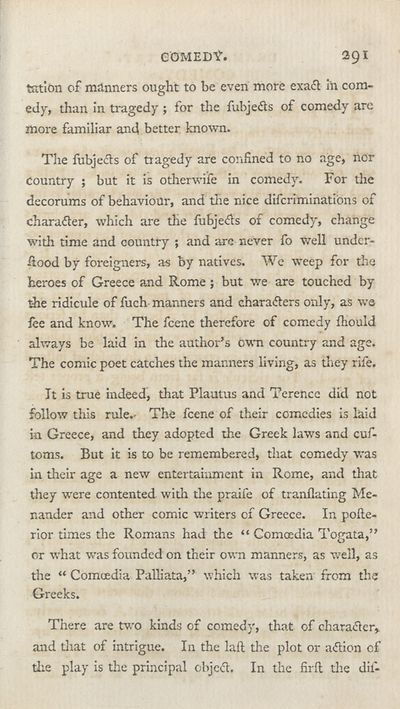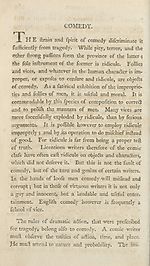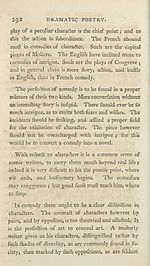Download files
Complete book:
Individual page:
Thumbnail gallery: Grid view | List view

GOMEDV.
29:
tatlon of manners ought to be even more exaft in com¬
edy, than in tragedy ; for the fubjedis of comedy are
more familiar and better known.
The fubjedts of tragedy are confined to no age, nor
Country ; but it is otherwife in comedy. For the
decorums of behaviour, and the nice difcriminations of
charadter, which are the fubjedls of comedy, change
with time and country ; and are never fo well under-
ftood by foreigners, as by natives. We weep for the
heroes of Greece and Rome; but we are touched by
die ridicule of fuch manners and charadters only, as we
fee and know. The fcene therefore of comedy fhould
always be laid in the author’s own country and age.
The comic poet catches the manners living, as they rife.
It is true indeed, that Plautus and Terence did not
follow this rule.- The fcene of their comedies is laid
in Greece, and they adopted the Greek laws and cuf-
toms. But it is to be remembered, that comedy was
in their age a new entertainment in Rome, and that
they were contented with tire praife of tranflating Me¬
nander and other comic writers of Greece. In pofte-
rior times the Romans had the “ Comoedia Togata,”
or what was founded on their own manners, as well, as
the “ Comoedia Palliata,” which was taken from the
Greeks.
There are two kinds of comedy, that of charader,
and drat of intrigue. In the laft the plot or action of
the play is the principal objed. In the firft die dif-
29:
tatlon of manners ought to be even more exaft in com¬
edy, than in tragedy ; for the fubjedis of comedy are
more familiar and better known.
The fubjedts of tragedy are confined to no age, nor
Country ; but it is otherwife in comedy. For the
decorums of behaviour, and the nice difcriminations of
charadter, which are the fubjedls of comedy, change
with time and country ; and are never fo well under-
ftood by foreigners, as by natives. We weep for the
heroes of Greece and Rome; but we are touched by
die ridicule of fuch manners and charadters only, as we
fee and know. The fcene therefore of comedy fhould
always be laid in the author’s own country and age.
The comic poet catches the manners living, as they rife.
It is true indeed, that Plautus and Terence did not
follow this rule.- The fcene of their comedies is laid
in Greece, and they adopted the Greek laws and cuf-
toms. But it is to be remembered, that comedy was
in their age a new entertainment in Rome, and that
they were contented with tire praife of tranflating Me¬
nander and other comic writers of Greece. In pofte-
rior times the Romans had the “ Comoedia Togata,”
or what was founded on their own manners, as well, as
the “ Comoedia Palliata,” which was taken from the
Greeks.
There are two kinds of comedy, that of charader,
and drat of intrigue. In the laft the plot or action of
the play is the principal objed. In the firft die dif-
Set display mode to:
![]() Universal Viewer |
Universal Viewer | ![]() Mirador |
Large image | Transcription
Mirador |
Large image | Transcription
| Antiquarian books of Scotland > Languages & literature > Abridgement of lectures on rhetoric > (307) |
|---|
| Permanent URL | https://digital.nls.uk/135470138 |
|---|
| Description | Thousands of printed books from the Antiquarian Books of Scotland collection which dates from 1641 to the 1980s. The collection consists of 14,800 books which were published in Scotland or have a Scottish connection, e.g. through the author, printer or owner. Subjects covered include sport, education, diseases, adventure, occupations, Jacobites, politics and religion. Among the 29 languages represented are English, Gaelic, Italian, French, Russian and Swedish. |
|---|

